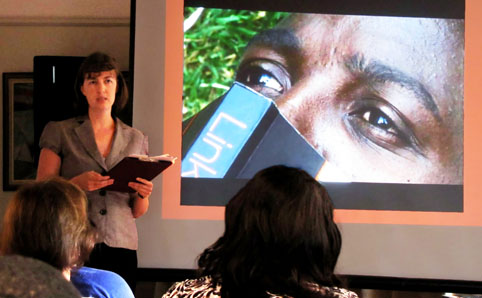Latest News Archive
Please select Category, Year, and then Month to display items
12 October 2020
|
Story Arina Engelbrecht
|
Photo Supplied
 Arina Engelbrecht from Organisational Development and Employee Well-being believes physical activity has a number of benefits for one’s health, including stress relief.
Arina Engelbrecht from Organisational Development and Employee Well-being believes physical activity has a number of benefits for one’s health, including stress relief.
Being physically active plays a big role in preventing the development of mental-health problems and in improving the quality of life of people experiencing mental-health problems.
Treatment for depression
Physical activity can be an alternative treatment for depression. It can be used as a stand-alone treatment or in combination with medication and/or psychological therapy. It promotes all kinds of changes in the brain, including neural growth, reduced inflammation, and new activity patterns are formed that promote feelings of calm and well-being. It releases endorphins – powerful chemicals in the brain that energise your spirit and make you feel good.
Physical activity can be very effective in relieving stress. Research in adults has found that physically active individuals tend to have lower stress levels compared to individuals who are less active. It also leads to improved sleep. When a person sleeps better and feels more rested, overall quality of life improves. They cope better with daily life stressors.
Reduce Alzheimer's risk
Regular physical activity can reduce your risk of developing Alzheimer's disease by up to 50%. It can also slow down further deterioration in those who have already started to develop cognitive problems. It stimulates the brain’s ability to maintain old connections as well as to make new ones.
A study asked people to rate their mood immediately after periods of physical activity (e.g. going for a walk/run, cycling, doing housework) and periods of inactivity (e.g. reading a book or watching television). Researchers found that participants felt more content, more awake, and calmer after being physically active compared to after periods of inactivity.
In conclusion, people who are physically active feel a sense of well-being, feel more energetic throughout the day, sleep better at night, have sharper memories, and feel more relaxed and positive about themselves and their lives.
“Being physically active not only changes your body, it changes your mind,
attitude, and your mood.” – Arina Engelbrecht
Critical conversations for an intellectually vibrant campus
2012-02-13
 |
Prof. Helene Strauss lead a discussion of Khalo Matabane’s film, Conversations on a Sunday Afternoon.
Photo: Amanda Tongha |
Our Bloemfontein Campus is set to become intellectually alive this year with a series of critical conversations hosted by our International Institute for Studies in Race, Reconciliation and Social Justice. The series of conversations promise an impressive line-up of prominent South Africans, amongst them Public Protector Thuli Madonsela and Nobel Literature winner Nadine Gordimer.
The first conversation for this year was hosted on 7 and 8 February 2012 with a screening and discussion of Khalo Matabane’s film, Conversations on a Sunday Afternoon. The discussion, led by Prof. Helene Strauss from our Department of English, looked at the ethics of conversing across cultural and other divides.
Speaking at the discussion Prof. André Keet, Director of our International Institute for Studies in Race, Reconciliation and Social Justice, said it bodes well for the university that it will listen to and view amazing intellectual work. He said, "The critical conversations directly speak to the human and academic project of the university."
The next critical conversation will be hosted on 21 February 2012 and will look at the politics of reconciliation.